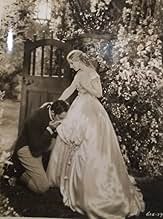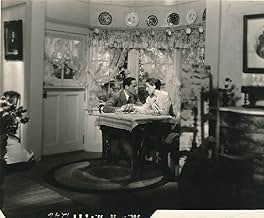The adoptive father of a young woman is horrified to learn she plans to marry the son of the man who accidentally killed her aunt years before.The adoptive father of a young woman is horrified to learn she plans to marry the son of the man who accidentally killed her aunt years before.The adoptive father of a young woman is horrified to learn she plans to marry the son of the man who accidentally killed her aunt years before.
- Nominated for 1 Oscar
- 6 wins & 1 nomination total
- Minister
- (uncredited)
- Young Party Guest
- (uncredited)
- Young Party Guest
- (uncredited)
- Young Kathleen
- (uncredited)
- Richard Clare
- (uncredited)
- Gardener
- (uncredited)
Featured reviews
Two eternal romances explained very well with one of the most tragic scenes of the time. Even though the film is titled Smilin', I believe there was hardly anything to smile at. It was more of a tragic romance for its time, or quite possibly all time. I wasn't aware that one of the biggest conflicts from one of the most popular romances, "Love Affair" (1939)-some people know it because of its remake, "An Affair To Remember" (1957)-was actually taken from this Sidney Franklin flick. Even that goes back in time, as Sidney himself remade his own silent film of 1922. Remember that accident thing from Love Affair? Why Terry couldn't see Michel and had to conceal her disability? Well, that was picked right from here-with a gender switch. Smilin Through has multiple layers to the characters and the love story. If I can say so, it was one of the rare films to have the three leading actors in a double role (Leslie Howard was a single character, but divided into two age groups). The film is about Kathleen, who falls in love with a young soldier, Kenneth, but her uncle, Sir John, forbids her because Kenneth's father killed his soon-to-be bride, Moonyean, on their wedding day. Kathleen still goes on to meet and fall in love with Kenneth before he is sent to War for four years. After his return, Kathleen is devastated by his rude behaviour and mourns her lost love. Now here comes redemption for Uncle John, who has been attempting salvation for years to meet his dead love. The screenplay does a nice trick here, as we see a happy ending and a sad ending coming together and leaving us with mixed feelings. Leslie Howard has played a part that other young fellas might have rejected for pride. He put them all to shame. Norma looks lovely, and Fredric is fine in both roles. Franklin did not have to do much except remove some dated chunks, and he did exactly that. A big triumph for a remake, and what a tragic cobweb of love stories it was for its time.
RATING - 7/10*
By - #samthebestest.
Norma Shearer is the orphaned niece who is raised by Leslie Howard. Fredric March is the dashing soldier she falls in love with, but Howard is opposed to the marriage because March's father was responsible for the death of Howard's wife. That wife visits him from time to time as a ghost also played by Shearer. There are a lot of moody scenes set in abandoned houses and lush gardens, and the whole thing has a dreamy atmosphere, enhanced by the blurring of lines between memories of the past and the actual present.
As an aside, I'm always fascinated by the treatment of World War I in films from the 1920s and 30s before anyone knew that World War II would come to dominate the cultural discourse later in the century.
"Smilin' Through" was nominated for a Best Picture Oscar in the 1932-33 award year, a year that saw ten nominees for the top prize. It belongs to a small list of films to receive a Best Picture nomination and no others, something that hasn't happened since 1943 but which is made more possible now that the Academy has gone back to nominating up to ten movies every year.
The full list includes: "The Racket" (1927-28); "The Hollywood Revue of 1929" (1928-29); "East Lynne" (1930-31); "Trader Horn" (1930-31); "Grand Hotel" (1931-32, the only film to actually win); "One Hour with You" (1931-32); "The Smiling Lieutenant" (1931-32); "She Done Him Wrong" (1932-33); "Smilin' Through" (1932-33); "Here Comes the Navy" (1934); "The House of Rothschild" (1934); "Ruggles of Red Gap" (1935); "Libeled Lady" (1936); "Grand Illusion" (1938); "One Foot in Heaven" (1941); "The Ox-Bow Incident" (1943).
Grade: B
He begins to realize, over the years, that the girl he is raising (Norma Shearer) is very similar in looks to his deceased wife. Because of this fact, he has a strong relationship with her.
One night, Shearer is off with a friend to an abandoned house. They find that someone else is there. The person who was there (Fredric March) is actually the son of the man who killed Howard's wife. And the abandoned house was where March grew up.
Shearer falls for March and when Howard sees this, he becomes jealous. Tensions rise in this excellent "tearjerker." It's only flaw is that it seems to get a bit overlong for what it's trying to tell right at the very end.
All of the three leads are amazing and should have been nominated for Oscars. Sadly, the only nomination it did get was Picture, which it should have won.
I loved the way the story was told, with a flashback, so that it was a bit like a movie within a movie. It also felt like love playing out across generations, and recurring, with all the same depth of feeling. Some of the scenes evoke a sentimental or poignant feeling – in the cemetery, remembering love lost – and others evoke that wonderful feeling of falling in love. The mansion scene, with that delicious ambiance of cobwebs, a fire, an old portrait, and with Shearer and March toasting one another after he finds an old bottle of port, is fantastic. "Any old port in a storm," he quips. The two have such chemistry together. Their bike ride and time in the teahouse is also sweet, after he had essentially admitted to stalking her ("you're a window-peeper", she teases). Towards the end of that scene Shearer says, almost breathlessly, "Love is ... something you feel. It just happens. You can't do anything about it. If I loved somebody, I'd love him forever", as the camera dissolves on the old woman who has fallen asleep.
I'm usually not big on Leslie Howard, but he was great too, and his scenes with the other character Shearer played were wonderful. He says to her "Wouldn't it be marvelous if every time I opened my eyes for the rest of my life, you were there?" She says: "I will be." And he says: "And always as beautiful as you are tonight?", the last bit echoing March's toast in the mansion. It's all the more touching seeing these kinds of scenes in an old movie where the actors have all passed away, but are captured in these moments, so ephemeral and fleeting, and yet with feeling so strong and dramatic.
Shearer's character's personality is a romantic, and the plot allows her to express her love with such urgency, because March is going away. It is reserved and proper, with almost all of the characters (except March's father / evil March and his drinking problem) having a sense of decorum and grace, and yet these two are allowed to express their love so freely and fiercely ... it's a great combination. As she says when he's going away, "It's no use, I'll always love him. I'm just that sort of a fool. I have no pride", any hopeless romantic can identify.
March's dual role may remind you a bit of his role in Dr. Jekyll and Mr. Hyde (though this is of course two characters), and as the film plays out, you may also be reminded of "An Affair to Remember". There is real angst here, from those whose love is unrequited for reasons that simply can't be explained – love happens or it doesn't – to those who suffer tragedy. When Shearer and March must part, she says with real passion, "I'm yours and you're mine; I want that to be true before you go" implying marriage and sex, but he demurs, torn.
And yet, how magical it is; the eyes, the smiles, the banter, the embraces. This would be a great movie to curl up in front of with someone you love.
Did you know
- TriviaFredric March commented to his first cousin, Kathryn Davis, about working with Norma Shearer, that, yes, she was a great actress and very professional, but she could be difficult because she constantly expected perfection. When Davis asked what that specifically meant, March replied, "She was never satisfied, kept having us do take after take." Pausing, he continued, unabashed, "Especially our love scenes. She always wanted to redo all the love scenes, several times!" Davis wanted to ask why he supposed Shearer always wanted to retake the love scenes in particular, but thought better of it and kept silent.
- GoofsThe bulk of the story takes place during the WWI era, 1915-1919, but all of Norma Shearer's clothes, hats, and hairstyles are in the 1932 mode, the year the film was made, a typical practice of the era.
- Quotes
Kenneth Wayne: How about a toast?
Kathleen: I know one. Here's to your health, your honor, and the health of all your descendants, great and small.
Kenneth Wayne: That's a mighty handsome toast.
Kathleen: But, Irish toasts are the best I know.
Kenneth Wayne: May you keep as young and as pretty as you are, until doomsday, and never forget the man who wished it.
Kathleen: I wonder now, as I look at you, have we never met before?
Kenneth Wayne: No, I guess we haven't. I shouldn't have forgotten.
Kathleen: Oh, could you be Irish too!
Kenneth Wayne: Yeah, I could, if I saw enough of you!
Kathleen: Oh!
- Crazy creditsAs MGM would later do with Le Magicien d'Oz (1939), no mention at all is made of any of the actors having dual roles. Thus, the characters "Moonyeen" and "Jeremy Wayne" are not mentioned in the credits, although the characters are drastically important to the story.
- ConnectionsFeatured in The Happy Ending (1969)
- SoundtracksSmilin' Through
(uncredited)
Written by Arthur A. Penn
Played on piano and sung by Norma Shearer (dubbed by Georgia Stark)
Music integrated into the score throughout
- How long is Smilin' Through?Powered by Alexa
Details
- Release date
- Country of origin
- Languages
- Also known as
- Smilin' Through
- Filming locations
- Production company
- See more company credits at IMDbPro
Box office
- Budget
- $851,000 (estimated)
- Runtime
- 1h 38m(98 min)
- Color
- Aspect ratio
- 1.37 : 1




































